As Frank Cownie closes chapter as Des Moines' mayor, a look at his 20 years in office

- Oops!Something went wrong.Please try again later.
Mayor Frank Cownie is closing a two-decades-long chapter on being "captain of the team" of Iowa's capital city.
Now 75, Cownie has led the way to build the city's extensive parks and trails system and tackled work on the city's infrastructure. The five-term mayor, who forged a reputation for environmental advocacy and spearheaded a plan for how the city will respond to climate change, also led Des Moines through catastrophic natural disasters such as the floods of 2008 and 2018 and a devastating derecho.
Cownie, who will step down in January, will be replaced by at-large council member Connie Boesen, who was voted mayor in the 2023 election.
Here's a look at Cownie's tenure through some of Des Moines' historic moments.
2003: Cownie's mayoral tenure begins
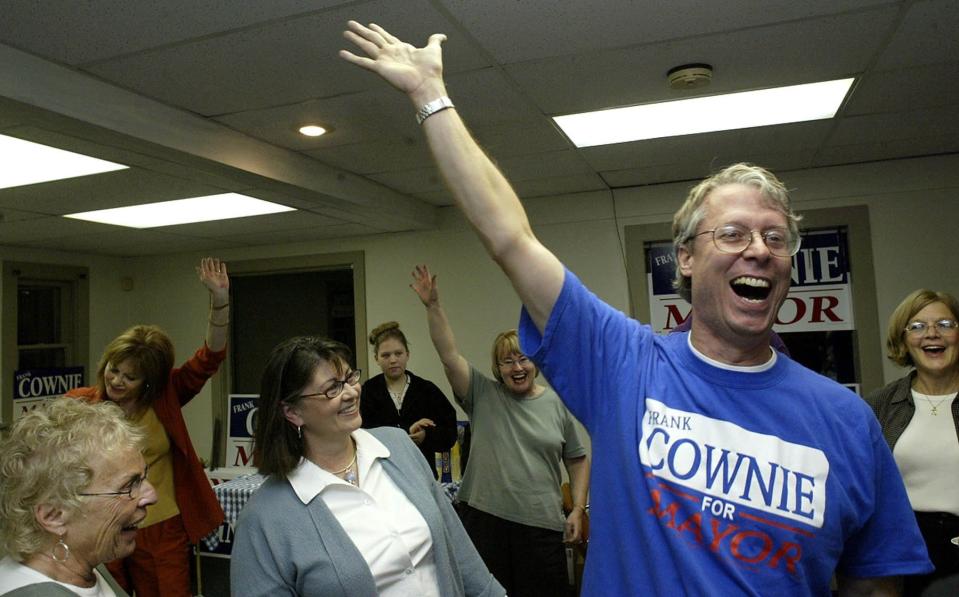
In his first run for mayor, Cownie went head-to-head with then-fellow council member Christine Hensley in 2003 to replace Preston Daniels. The election was the last time any mayoral candidate had secured more than 10,000 votes until the election this November.
Cownie's run was prompted in part by a concern over Des Moines' budget problems. At the time, city leaders had eliminated at least 40 full-time employees, tripled overtime parking meter fines and shut off power to about 50% of the city's nonresidential street lights to help make up for a looming $4.7 million budget shortfall resulting from state cuts, according to Register archives.
The issue prompted one of Cownie's campaign slogans: "...we're not just going to turn the streetlights back on, we're going to turn the lights back on in City Hall."
"They were going so far as to turn out streetlights — every other street light — and so it was sort of like, 'No, this is a public safety issue, you know, turning out streetlights is not going to make the streets safer,'" he told the Des Moines Register.
2005: First part of the decades-long Martin Luther King Jr. Parkway completed
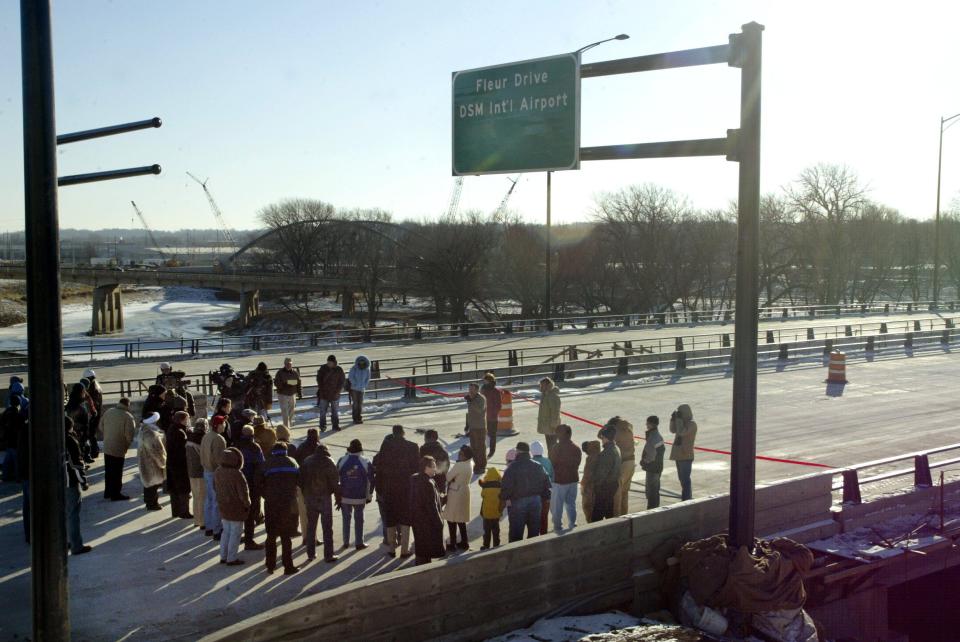
The multi-phase construction of Martin Luther King Jr. Parkway goes back decades.
Initially, the parkway was intended to divert traffic from downtown streets to an elevated freeway encircling downtown's western and southern borders. But local business leaders like Cownie became concerned that the highway would cut off development in an industrial area just south of the central business district.
"And we said, "No, this should be more of a boulevard ... and not a divisive piece, a place where pedestrians can move across,'" Cownie said. "It could've been a little more pedestrian-friendly but I think they've done fairly well on finding ways to make it work."
The first piece of the parkway between Interstate 235 and the Des Moines River on the west side of downtown was constructed from 1999 to 2005. The next phase, built between 2006 and 2016, extended the parkway from the river east to Southeast 30th Street. The last segment, to break ground in 2024, will reach U.S. Highway 65.
2008: Historic flood, Birdland Levee failure forces evacuations
In 2008, Des Moines and other parts of Iowa experienced historic flooding caused by melting from the winter’s heavy snowfall and above-average rainfall that began Memorial Day weekend.
The surge of water ruptured the Birdland Levee on June 14, 2008, forcing city officials to issue voluntary and mandatory evacuations for more than 250 homes in low-lying areas on Des Moines' north side. Other places affected included Gray’s Lake, Des Moines’ North High School, and Principal Park.
Since then, more than $20 million has been spent rebuilding the levees, and millions more have been spent buying properties, tearing down buildings and relocating residents.
Cownie sees the flood as a devastating milestone of his time in office. He emotionally recounted the hard work community members did to raise the levee 2 feet with sandbags.
"We literally had thousands of Des Moines residents from every walk of life ... they all came," he said. "My heart was like, 'Wow,' here they are, filling sandbags and throwing them on a truck. And we did it."
Unfortunately, the levee was breached anyway and collapsed.
"It touches my heart to think about it today, seeing the tears of all the people who worked so hard to try to alleviate that thing that happened," he said.
But Cownie said the effort highlighted the resolve of the community to come together. It also prompted the city to address levee deficiencies to prevent a similar disaster.
2015: Des Moines Water Works lawsuit

Des Moines Water Works voted in early 2015 to sue drainage districts in three northern Iowa counties the water utility claimed were funneling high levels of nitrates into the Raccoon River, a source of drinking water for 500,000 central Iowa residents.
The utility sought federal oversight of the drainage districts in Sac, Buena Vista and Calhoun counties — and indirectly farmers — under the Clean Water Act. The legal battle, which played out for more than two years until a federal judge ruled to dismiss the suit, created a divide between rural and urban Iowa.
The issue carried into what Cownie calls a "really ugly" 2019 mayoral election between him and his opponent former state Sen. Jack Hatch. Hatch accused Cownie of abstaining from a 2017 vote to oppose the Iowa Legislature's attempt to dismantle the utility. The late Bill Stowe, Des Moines Water Works CEO, said at the time the legislation was retaliation for the lawsuit.
Cownie, who said he supported the lawsuit, told the Register a decision should be made over who is "actually responsible to enforce the Clean Water Act and what rules should we put in place to make that happen."
2018: Flash flood in Des Moines metro launches historic investment in infrastructure
The Des Moines metro in the summer of 2018 was inundated with nearly 9 inches of rain in less than four hours.
The flash flood forced emergency evacuations, caused damage to at least 1,800 homes in the city and killed at least one person. Areas near Fourmile Creek and Walnut Creek sustained the most damage after both creeks had record-high crests.
That day, Cownie and his family were returning from his grandson's baseball game in Cedar Rapids. Cownie recalls the low visibility as the family crept down Interstate 235 toward Des Moines. He also remembers not being able to get off at the exit for his house because of deep water on the roads.
"It was just like, 'Wow, how does this happen?'" he said.
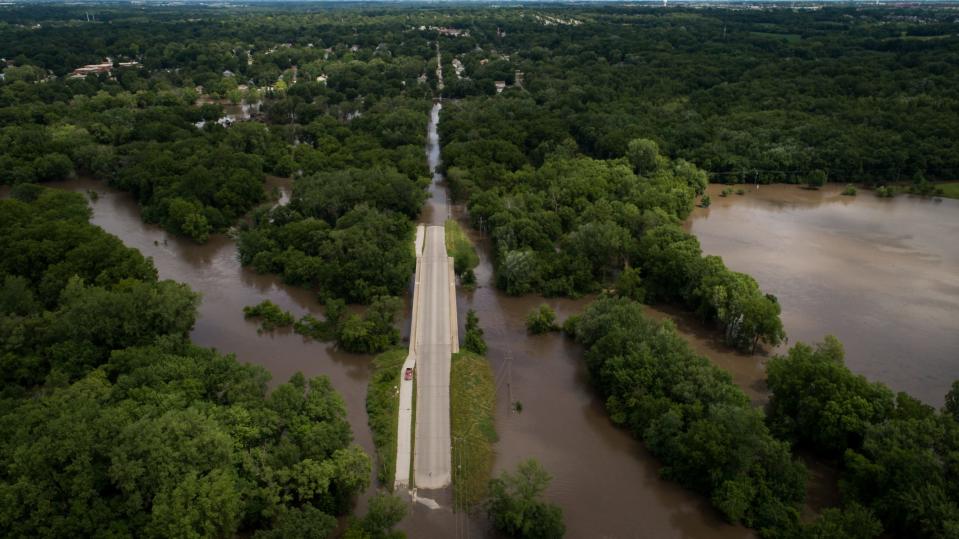
The weather phenomenon led the city to accelerate its stormwater response, devoting more than $60 million since the event to flood mitigation and stormwater improvements, according to city officials.
One of the projects included $7 million toward the construction of a reinforced concrete storm sewer box culvert to replace a smaller, wood box culvert in Beaverdale, an area where pipes simply weren't big enough to handle the intense storm.
2020: COVID-19, civil unrest after the murder of George Floyd
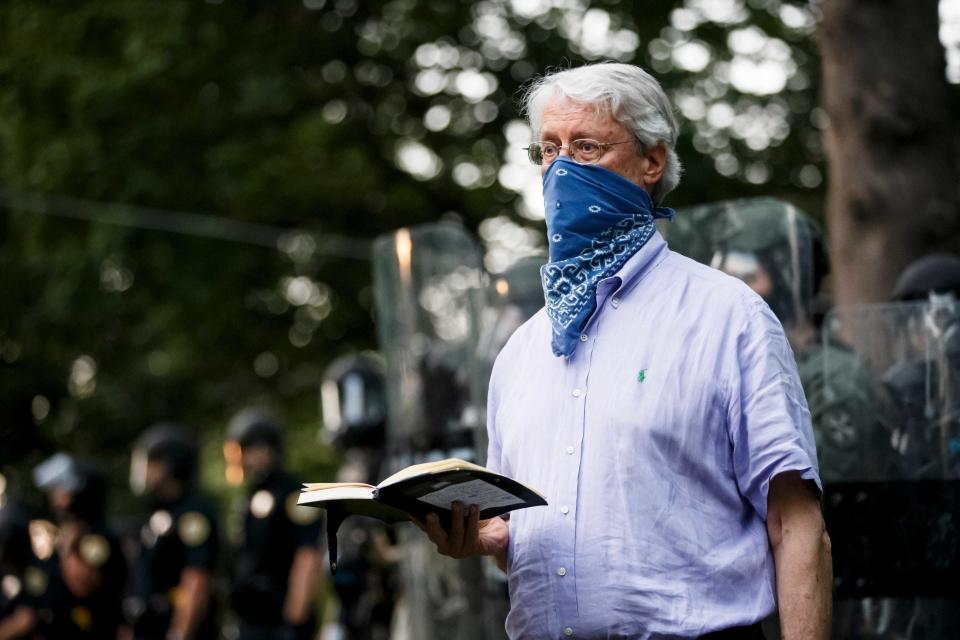
Cownie says declaring a state of emergency on March 15, 2020, due to the COVID-19 pandemic was one of the "greatest challenges" during his time in office.
Cownie recalls having a conversation about the quick spread of the virus with Florence, Italy's Mayor Dario Nardella during a virtual climate change conference in the fall of 2019.
"He said, 'You better get ready,' so I started watching it," Cownie said. "And then when we started seeing cases we were like one of the first cities in the county to declare a medical emergency where we released CDC and WHO guidelines. You know, at first, it was distance and wash ... and then in the fall, we did do a mask mandate, but I did it based on all the input from health experts around the county."
At the time of Cownie's declaration, there were 18 cases reported across the state of Iowa and none in Polk County. But in the course of three-plus years, Iowa reported more than 900,000 cases and nearly 11,000 deaths. Polk County experienced roughly 147,000 cases and 1,200 deaths.
"That health crisis tested us in ways we never knew and never expected," he wrote in his farewell letter to Des Moines. "It changed how we worked and the way that we lived. Our daily routines became anything but simple and a return to an ordinary life seemed so unreachable. "
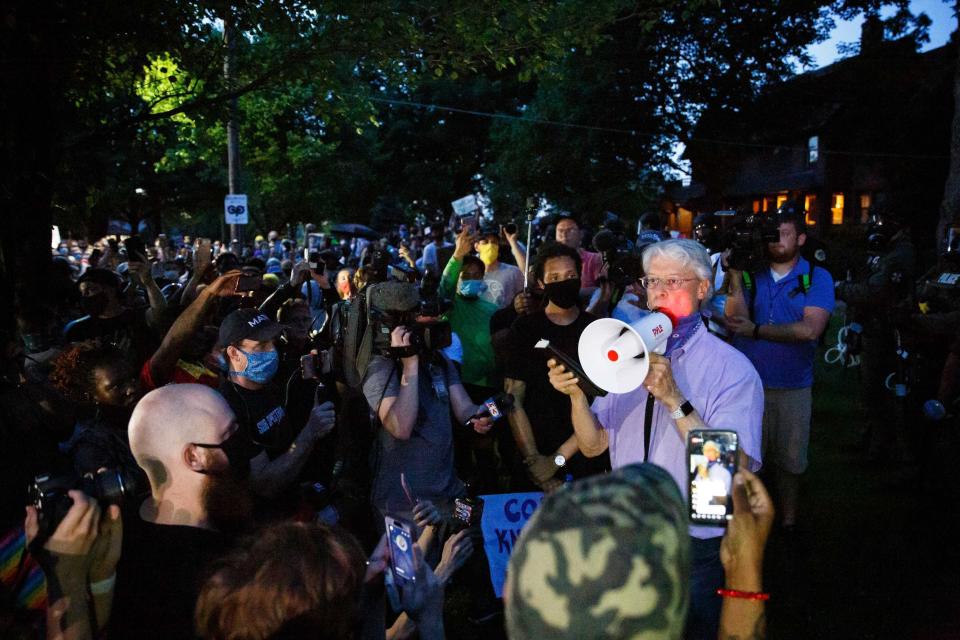
And in the midst of the health emergency, thousands of protests erupted nationwide with calls for an end to police brutality following the killing of George Floyd. Floyd, a Black man, died May 25, 2020, after a Minneapolis police officer pressed his knee on Floyd's neck for nearly nine minutes. Floyd was apprehended after being accused of using a counterfeit $20 bill.
Just days into Des Moines' own slate of summer protests, about 1,000 marchers arrived at Cownie's house on the west side of the city, making demands such as the release of all protesters from jail and public support for a proposed ban on racial profiling.
“I hear your hearts, I hear your pain," said Cownie, as he took notes before going over the protestors' demands one by one. "I thank you for doing it in a peaceful way, and let’s continue that."
2003-2023: Des Moines' downtown renaissance
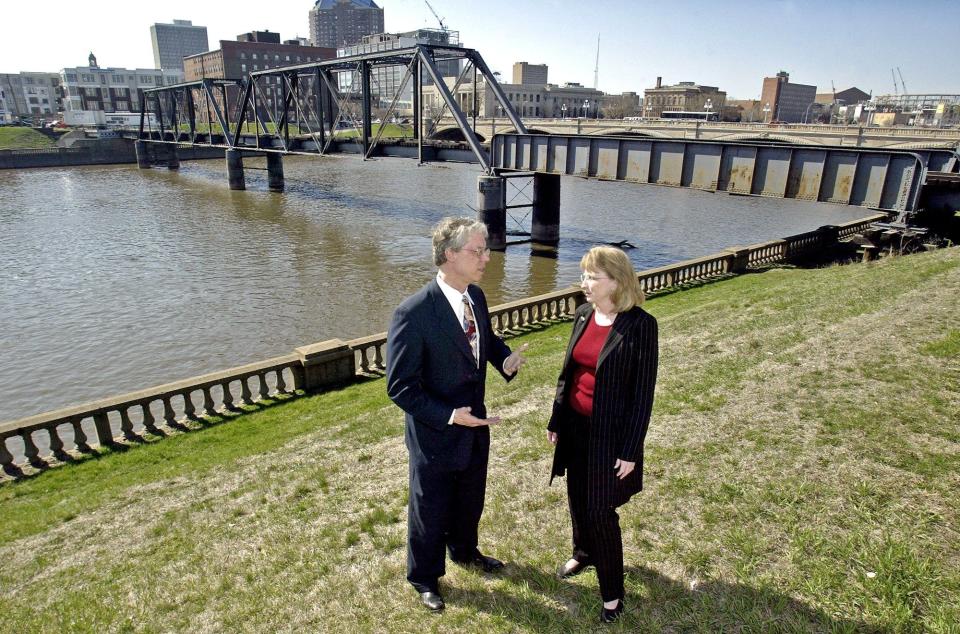
The past two decades have brought an undeniable renaissance to downtown Des Moines, from staple developments like the Principal Riverwalk along the Des Moines River and the Wellmark building to the transformation and expansion of favorites like the Historic East Village and the Greater Des Moines Botanical Garden.
Cownie, who calls Des Moines the "heart of Iowa," said: "There's so many things to do in Des Moines ... there's nothing like it between Chicago and Denver."
The decade between 2011 and 2021 yielded about $2.1 billion in investments by developers, homeowners and businesses, seeded by millions of dollars in tax breaks and other assistance from the city and state, according to a Register review of building permits. The permits represented nearly 44% of the $4.9 billion invested citywide over the same timeframe.
In the first decade of the new century, city leaders were focused on making downtown a major jobs center. And even in the face of the Great Recession, from around 2007 to 2009, the decade brought some of Des Moines' major anchors, like the nine-story Wells Fargo Bank building at 801 Walnut St., the Wells Fargo Arena and Iowa Events Center, the Western Gateway Park, and the John and Mary Pappajohn Sculpture Park.
More: Downtown gets almost half of Des Moines' investment. Will it continue to pay off?
Once downtown had daytime vibrancy, the focus shifted to housing — primarily by providing low-income and historic tax credits to mitigate risk for developers.
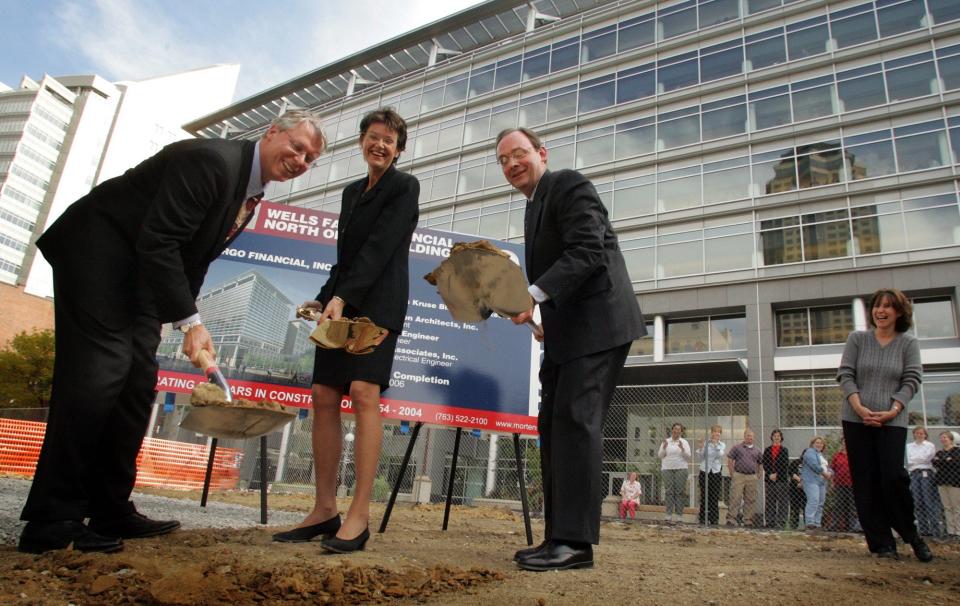
Cownie says a large part of the city's evolution is about the number of people who have made the downtown core their home, a number that has tripled since the 1990s and early 2000s. There are an estimated 13,000 downtown residents, Cownie says.
"We tried to make downtown a place that people would want to come and stay ... and now, (there are) great restaurants in downtown, great places to get entertained," Cownie said.
Virginia Barreda is the Des Moines city government reporter for the Register. She can be reached at vbarreda@dmreg.com. Follow her on Twitter at @vbarreda2.
This article originally appeared on Des Moines Register: What happened in Des Moines during Mayor Frank Cownie's time in office

